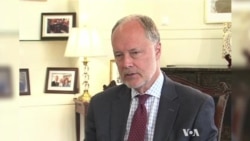As a recount of votes in the Afghanistan presidential election grinds into a third month, U.S. Ambassador James Cunningham said several crucial policy decision deadlines loom.
Cunningham spoke to VOA's Afghan Service at the U.S. Embassy in Kabul about the speed of the election audit, the timetable for inaugurating a new president and the upcoming NATO summit in September.
Afghan President Hamid Karzai said late last week that he predicts the country will have a new leader by the end of August, when he plans to leave office.
Karzai has refused to sign a bilateral security agreement with the United States that allows for a foreign force to stay in the country to train, advise and equip Afghan security forces after 2014. He said the decision to sign the agreement rests with his predecessor.
Both presidential candidates, Abdullah Abdullah and Ashraf Ghani, have said they would sign the agreement.
Ambitious goal
Cunningham said that while the goal of having a president in place in a few weeks is ambitious, “it’s an important goal to keep.”
The NATO summit, scheduled for Sept. 4-5 in Wales and hosted by England, is important because the nations had hoped to celebrate the upcoming withdrawal of international combat troops from Afghanistan and the move toward a smaller, advisory force that would train Afghan security forces.
Having a president inaugurated by early September, Cunningham said, would be an important opportunity for a new president to represent Afghanistan and a new government, as well as reconnect with the international community.
But he also voiced concern that the goal can be met.
“We’re doing everything we can to speed up the audit and to encourage the political discussions between the candidates and their teams to try to prepare, if we can, to achieve that goal. If we can’t, it will be a lost opportunity. But it’s possible,” Cunningham said.
He said the audit of the June 14 presidential runoff “has not moved as rapidly as we had hoped because of the complexity of the procedures and the scope of the audit itself, which is really unique and unprecedented.”
Last month, after months of turmoil and voter fraud allegations, Abdullah and Ghani agreed to an audit of all 8 million votes cast.
Unity government
U.S. Secretary of State John Kerry visited Afghanistan twice, including early this month, to meet with Abdullah and Ghani to press for a resolution to the contested election.
During that meeting, both candidates, with Kerry's mediation, agreed to form a unity government ahead of the NATO summit.
Cunningham said the U.S. continues to work with the candidates.
“On the political side, we’re encouraged that the candidates have organized themselves, they have an agenda, they have established their joint commission with working groups, and they’re now beginning to work through the issues that they need to work through in defining a lot of the terms about what their future cooperation will be,” he said.
“I’m encouraged because I think the candidates understand how important it is that they find a way to come to an agreement that will provide for cooperation between people who frankly have been very strong competitors, and it’s hard to shift from competition to cooperation,” Cunningham said.
“But it has to happen for the next government, the president to be effective and to have broad support of the Afghan people,” he added.
If the recount should not conclude by the end of August, Cunningham said there are two consequences, the main being that Afghanistan loses a chance to represent a new phase in its government at the NATO summit.
In a larger sense, he said the Afghan people just want to see the political process concluded.
NATO's role
A bigger, more pressing issue as the presidential election recount goes on regards the status of NATO.
NATO is to end its combat mission in Afghanistan at the end of 2014. It plans to leave behind a smaller force to train and advise Afghan security forces.
However, to stay beyond 2014, NATO said it needs the new president to sign agreements with the U.S. and NATO, providing a legal basis for foreign troops to stay.
NATO Secretary General Anders Fogh Rasmussen said if the election gridlock is not resolved, and a new president does not sign the BSA, and a companion NATO agreement, he will soon be forced to decide on a complete withdrawal of NATO forces from Afghanistan.
The delays in signing the agreements have sharply reduced the time required for planning the post-2014 mission, causing concern at NATO.
Cunningham said he couldn’t speculate how long NATO could forestall such a decision. Although, last week, Rasmussen told Reuters the situation was becoming critical.
“There’s no fixed date,” Cunningham said. “But there is a time in the real world where both we and our partners will have to start making decisions. … We have real-world planning considerations that will come into play in the coming weeks.”
Cunningham said he remained confident that the recount would be finished and a decision made regarding a continued U.S. and NATO presence in Afghanistan after 2014.
View the interview on VOA Pashto or VOA Dari.
The interview was conducted by Rahim Gul Sarwan in Kabul.





